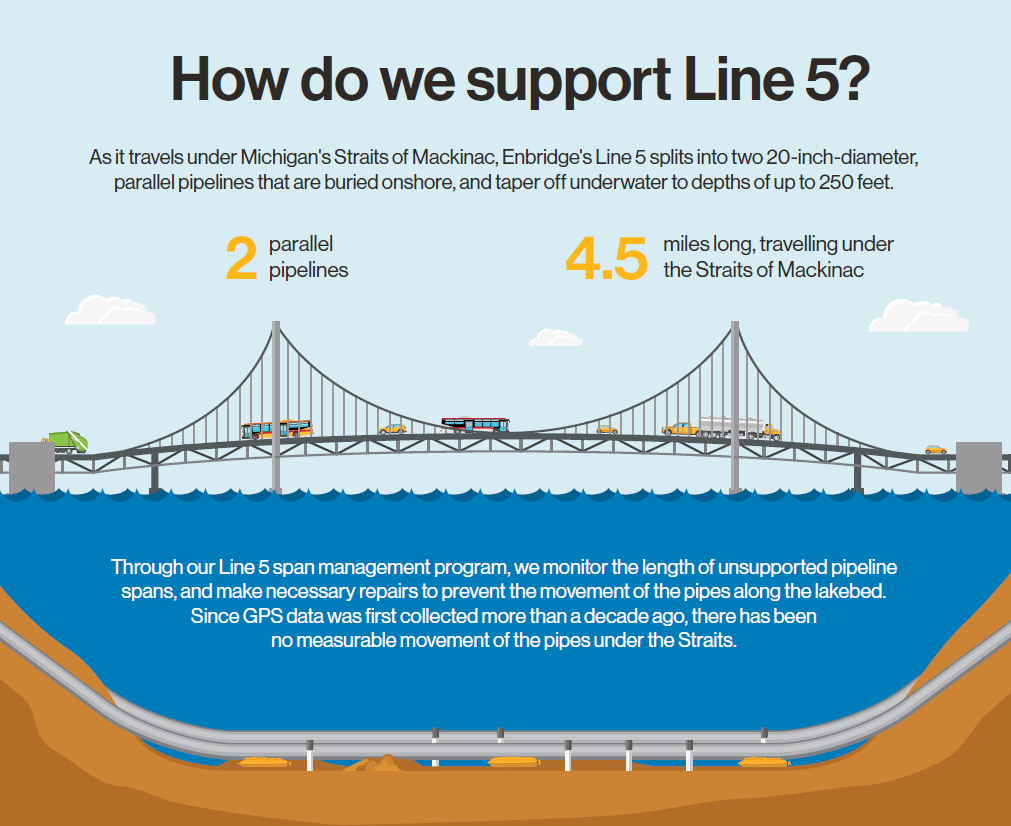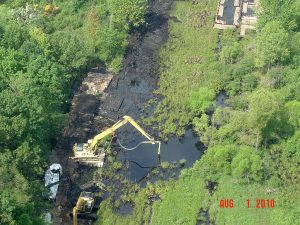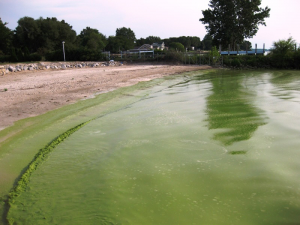
Candidates strongly disagree
As the race to replace Michigan Governor Rick Snyder nears the finish line, candidates Republican Bill Schuette and Democrat Gretchen Whitmer are sharply divided on what to do about Enbridge’s Line 5 pipeline in the Straits of Mackinac.

EPA‘s response to the 2010 Enbridge oil spill on Talmadge Creek near the Kalamazoo River, Photo by epa.gov
Pressure has been mounting since 2013 to decommission the aged pipeline where a rupture would wreak havoc with the ecology of Lakes Michigan and Huron and the tourism economy.
Snyder recently announced a deal with Enbridge to replace Line 5 with a pipeline in a tunnel beneath the Straits, a move quickly criticized by environmental groups.
“I think the tunnel is a very good solution,” Schuette told a group of journalists from the Detroit Journalism Cooperative who interviewed the candidates.
As Attorney General, Schuette has long-said that Line 5’s “days are numbered” but he hasn’t provided specifics on a plan to decommission or replace it.
Responding to questions, Schuette said Line 5 should be replaced with a different approach including one that meets energy needs of Michigan’s Upper Peninsula.
Schuette said he had “advocated” for the tunnel in the past and is “glad that there is an agreement now and that the sooner we get to work the better.”
Troubling announcement
“I think the governor’s recent announcement with regard to Line 5 is very troubling,” Whitmer said. “He’s tying the hands of the next governor.”
She said the plan places trust in Enbridge that is undeserved and that it would be “foolish and dangerous” to allow them to proceed with the tunnel plan.
Whitmer said she would challenge the decision in court but didn’t provide details saying that specifics of the tunnel plan are needed.
Asked if her end goal would be a shutdown of Line 5, Whitmer responded “I want the oil out of the water.”
Flint
Both Schuette and Whitmer stayed on high-level talking points on Flint.
Schuette emphasized his record as attorney general of prosecuting those who his office deemed were responsible for the Flint crisis, and he defended himself against allegations that his actions were politically motivated.

Flint, Michigan, Photo by Michael Sellers
“I make no apologies that people have pled guilty to crimes because I know families in Flint today that only drink water from a plastic bottle and they wash their vegetables only with water from a plastic bottle.”
Schuette said if elected he’d work to rebuild Flint’s trust in government.
Whitmer said the precursor to Flint’s problems was the Emergency Manager Act that allowed the governor to appoint emergency managers who made the decisions that precipitated the crisis in Flint.
She said she opposed that law when in the legislature and would work with Flint’s mayor to expedite replacement of lead pipes.
PFAS: Long term view and D.C. experience
On the PFAS emerging chemical crisis, Whitmer said experts tell her what’s known now is only the tip of the iceberg.
She took a longer view saying “I’m going to hire the finest environmental scientist to run the department and tell me what the best steps are to get moving on this (cleanup).”
Schuette said “what we need to do in Michigan is devote sufficient state resources to providing first clean and safe water.”
He emphasized his congressional experience in Washington as an asset for working on the PFAS problem with the federal government.
Ohio and Lake Erie
Like Michigan, Ohio will replace a term-limited governor.
Republican Mike DeWine and Democrat Richard Cordray have publicly talked in general terms about Lake Erie’s algae problems related to the threat to drinking water.
Cordray lays blame for the lack of progress on the administration of outgoing Republican Gov. John Kasich and by implication, DeWine who has been attorney general.
It was only earlier this year that Kasich took a tougher approach with farmers whose nutrient runoff fuels the algae blooms, though that action is currently stalled in a state agency.
DeWine, as a progressive Republican has defended his environmental record in general terms.
In a January 2018 survey of voters, 25 percent of respondents said fixing Michigan’s infrastructure was the top priority and that included water infrastructure.
Improving the quality of education was second with 16 percent and controlling crime and drugs third with 15 percent.
Protecting the environment – air and water – ranked 6th with 7 percent of respondents saying it is their top priority.
The research was done by the Lansing market research company Epic-MRA. In a similar poll in Illinois, 4 percent of respondents said the environment is their top priority.
————————-
The Detroit Journalism Cooperative includes The Center for Michigan’s Bridge Magazine, Detroit Public Television, Michigan Radio, WDET, New Michigan Media and Chalkbeat Detroit a partnership of ethnic and minority newspapers.






